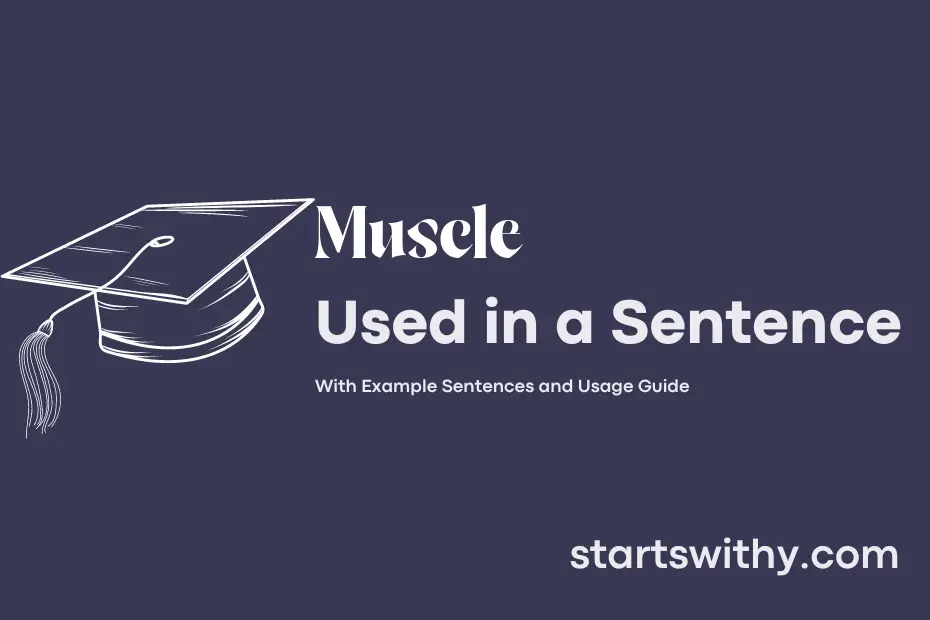Have you ever wondered how to properly use the word “muscle” in a sentence? “Muscle” is a noun that refers to a tissue in the body that contracts to produce movement.
In the context of grammar, when using “muscle” in a sentence, it is important to pair it with appropriate verbs to describe the action the muscle is performing.
7 Examples Of Muscle Used In a Sentence For Kids
- Muscles help us move our bodies.
- We need to exercise to make our muscles strong.
- We use our muscles when we run and jump.
- Eating healthy food is important for our muscles.
- We can feel our muscles when we touch our arms.
- We can make silly faces by using the muscles in our face.
- Our hearts are also muscles that help pump blood in our bodies.
14 Sentences with Muscle Examples
- Muscle fatigue can be reduced through regular exercise and proper nutrition.
- It is important to maintain a good balance between muscle strengthening and cardio exercises.
- Stretching is crucial to prevent muscle cramps and injuries during workouts.
- Eating a diet high in protein can help in muscle recovery and growth after intense workouts.
- Adequate rest is essential for muscle recovery and overall fitness progress.
- Regular resistance training is key to building muscle mass and strength.
- It is important to warm up before exercising to prepare your muscles for the workout ahead.
- Hydrating properly is essential for maintaining muscle function and preventing cramps.
- Listening to your body and knowing when to rest is crucial for avoiding muscle strain.
- Muscle imbalances can lead to poor posture and increase the risk of injuries.
- Incorporating yoga or Pilates into your workout routine can help improve muscle flexibility and balance.
- Proper form is essential in weightlifting to target specific muscle groups effectively.
- Gradually increasing the intensity of your workouts can help in muscle growth and strength development.
- Getting enough sleep is essential for muscle repair and growth, especially after intense workouts.
How To Use Muscle in Sentences?
Muscle is a group of tissues in the body that helps with movement and support. To use the word Muscle in a sentence, start by identifying the specific muscle you want to talk about. For example, “The athlete’s muscle was sore after an intense workout.” In this sentence, muscle refers to a specific muscle in the athlete’s body that is experiencing discomfort.
Next, make sure to provide context for the word Muscle in your sentence. You can describe its function, location, or appearance to give a clearer picture to your readers. For instance, “Her muscle flexed when she lifted the heavy weight.” This sentence provides context by showing the action that the muscle is involved in.
Additionally, you can use Muscle in a sentence to discuss strength, agility, or physical fitness. For example, “Building muscle through weight training can improve overall health.” This sentence highlights the connection between muscle and health benefits.
Remember that Muscle is a versatile word that can be used in various contexts. By providing specific details and context in your sentences, you can effectively communicate the meaning and importance of Muscle to your audience.
Conclusion
In conclusion, sentences with the word “muscle” can describe various aspects related to physical strength, anatomy, or exercise. These sentences often highlight the importance of maintaining a healthy and toned muscular system for optimal functioning of the body. Whether discussing muscle growth through weightlifting or the benefits of stretching to prevent muscle injuries, these sentences underscore the significance of incorporating regular physical activity into one’s lifestyle.
Furthermore, sentences with “muscle” can also refer to metaphorical strength, such as the resolve and determination needed to overcome challenges. They serve as a reminder that just as our physical muscles require training and care to stay strong, our mental and emotional resilience also needs nurturing to cope with life’s difficulties. Embracing the concept of muscle in both physical and metaphorical contexts can inspire us to strive for overall wellbeing and strength in our daily lives.



